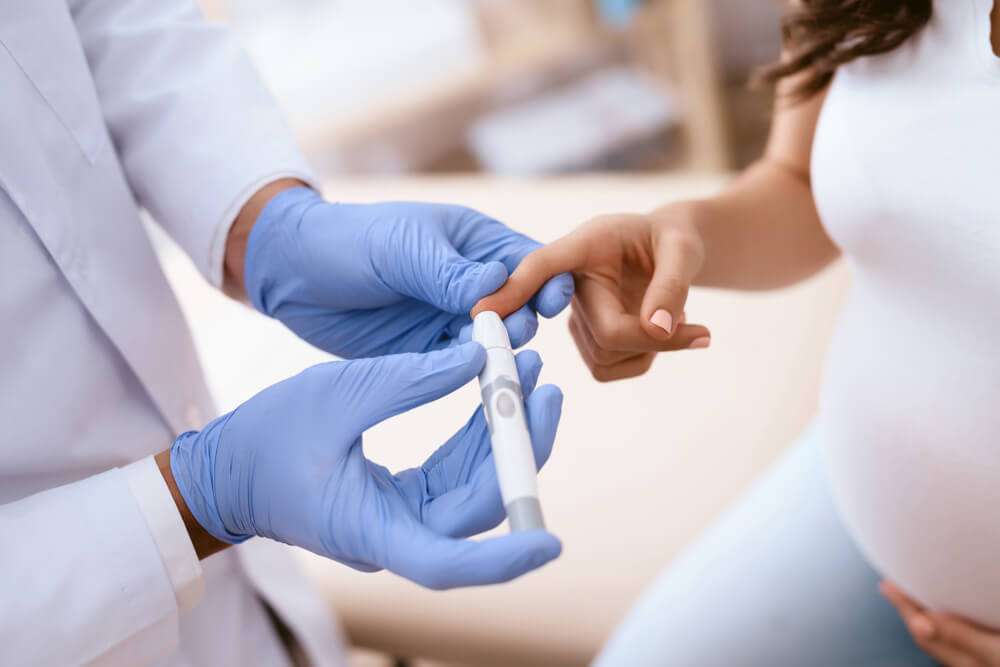November is National Diabetes Month and we celebrate by promoting awareness of the different types of diabetes and the treatment resources available.
At South Miami OB-GYN Associates, our focus is on gestational diabetes, the type of diabetes that can develop during pregnancy. A diagnosis of gestational diabetes often triggers anxiety and our goal is to provide education, treatment, and support during your pregnancy and after. Gestational diabetes prevention is not always a reality but there are ways to minimize your risks.
SCHEDULE YOUR APPOINTMENT TODAY
Understanding Gestational Diabetes
Our bodies produce a hormone called insulin. This hormone is generated in the pancreas and regulates your blood sugar, also called glucose which produces energy. For some, the pancreas slowly begins to reduce the amount of insulin it produces, eventually producing none. This is what occurs with type 1 diabetes, which is generally caused by a combination of genetic and environmental factors. For others, the pancreas may not be producing enough insulin or the body’s cells aren’t absorbing it effectively. This is what occurs with type 2 diabetes which also has a strong genetic component.
Pregnancy can cause a third form of diabetes called gestational diabetes. During pregnancy, your body changes and produces hormones from the placenta. These hormones can block the insulin, making it difficult for the glucose to enter the cells. This is called insulin resistance and can result in your body needing additional insulin, typically in the second or third trimester.
According to the CDC, between 2% and 10% of U.S pregnancies are affected by gestational diabetes annually. An estimated 50% of women who develop gestational diabetes subsequently develop type 2 diabetes. Babies born from mothers with gestational diabetes are also at an increased risk for obesity and for developing type 2 diabetes. Generally, there are no noticeable symptoms of gestational diabetes though sometimes increased thirst or frequent urination may indicate a problem.
Fortunately, understanding how to prevent gestational diabetes, aka gestational diabetes prevention, can help mitigate the risks of developing it.
“Although there is no way to completely prevent gestational diabetes, there are some ways you can reduce the risk of developing it, “explained OB-GYN Xiomara Martinez MD.

What Are My Risks of Developing Gestational Diabetes?
If you don’t already have type 1 or type 2 diabetes, your risk factors for developing gestational diabetes depend on your current health condition and your family history.
Some factors that may increase your risk for developing gestational diabetes include:
- Being overweight/obese
- Having prediabetes
- Having a person or family history of gestational diabetes
- Having had a previous birth exceeding 9 pounds
- Having PCOS
- Having a history of heart disease
Your OB-GYN will administer certain tests between your 24th and 28th week of pregnancy to see if you have gestational diabetes and identify the potential risks of being diagnosed with gestational diabetes. If you are at a high risk of gestational diabetes, screening may be scheduled sooner.
How To Reduce the Risk of Gestational Diabetes
Similar to type 2 diabetes, gestational diabetes is closely associated with weight. Therefore, the best way to lower your risk of developing gestational diabetes is to eat well, exercise, and maintain a healthy weight both before and during your pregnancy. A registered dietitian can help you craft a meal plan that will work best to help you meet your goals.
Eating too many carbohydrates can cause your blood sugar levels to spike. We, therefore, recommend you limit your intake of carbohydrate-rich foods, such as pasta, potatoes, crackers, bread, and milk. Instead, swap recipes with lower-carbohydrate foods, like quinoa, cauliflower rice, zucchini noodles, spaghetti squash, or roasted rutabaga.
Other dietary recommendations for maintaining a healthy weight:
- Meet with a registered dietitian to get a personalized assessment and the basics for a realistic gestational diabetes diet
- Eat starchy foods in moderation, but don’t avoid them altogether
- Limit daily fruit intake to 1-3 portions
- Avoid sugary foods for breakfast, like cereals and pastries
- Avoid adding sugars like table sugar, honey, or syrup to foods (look for artificial sweetener brands instead, like Equal, NutraSweet, and Splenda)
- Keep an eye on “sugar-free” products as they may be high in carbohydrates
- Keep a daily food record to monitor your carbohydrate intake and blood sugar levels
Following these recommendations as part of a gestational diabetes diet can help prevent and improve cases of gestational diabetes, particularly when combined with regular exercise. Our recommendation is 30 minutes of moderate intensity exercise at least five times per week.
Daily exercise for gestational diabetes that promotes healthy blood sugar levels:
- Yoga
- Swimming
- Walking
- Water workouts
- Stationary cycling
Treatment for Gestational Diabetes
If you are diagnosed with gestational diabetes, there is good news! It is entirely treatable. Your OB-GYN, perhaps in partnership with an endocrinologist or maternal fetal medicine specialist, will work with you to develop a customized plan for treatment during your pregnancy. The key to successful treatment, however, is to catch it early and monitor it closely while taking careful measures to combat it. The specifics of your treatment plan will depend on various factors, such as your age, overall health, the severity of the condition, your treatment preferences, and more.
Some personalized treatment options may include:
- Insulin injections or other glucose-controlling medications
- An exercise plan
- Daily monitoring of blood glucose levels
- A customized diet, including or excluding certain foods
Fortunately, gestational diabetes often goes away after giving birth. However, if the diet and lifestyle that initially caused it remain unchanged, you may be at a greater risk for developing type 2 diabetes. A postpartum screening with your PCP is recommended as a precautionary measure.
The Risks of Gestational Diabetes
The risks of gestational diabetes for the mother include high blood pressure and preeclampsia, labor difficulties, having a C-section, and a higher risk of developing type 2 diabetes.
There are also major risks of gestational diabetes for the baby. In most cases, pregnant women develop gestational diabetes after the critical first trimester. However, if left untreated, poorly controlled gestational diabetes can put your baby at a greater risk for:
- Hypoglycemia, aka low blood sugar
- Preterm labor
- Serious respiratory difficulties
- Excessive birth weight
- Macrosomia-large baby
- Increase risk of stillbirth
- Jaundice (yellowing of the skin or whites of the eyes)
- Extended NICU stay
The best way to control the risks of gestational diabetes is early diagnosis, constant monitoring, and carefully following the diet, exercise, and if necessary, medication regiment prescribed by your OB-GYN.

Building Your Team in Honor of National Diabetes Month
According to the National Institute of Diabetes and Digestive Diseases, diabetes affects about 37 million Americans. If you develop diabetes, of any kind, it’s important to know that you are not alone.
This year’s National Diabetes Month theme is centered on diabetes management, of which the first step is to build a trusted healthcare team. Your team should consist of each healthcare provider you may need, including a primary care doctor, a registered dietitian, a certified diabetes educator, a board-certified OB-GYN, and possibly an endocrinologist. Ultimately, your doctor or OB-GYN will help you determine who should be on your healthcare team.
If you’re pregnant or planning to become pregnant, the physicians and nurse practitioners at South Miami OB-GYN Associates are well-trained in diagnosing and treating gestational diabetes and work with other team members to promote a positive pregnancy experience. Gestational diabetes prevention and treatment is our area of expertise. With offices in Downtown Doral and South Miami, we look forward to welcoming you and providing you with the most up-to-date diagnostic and treatment information before, during, and after your pregnancy.
Schedule an appointment online with one of our OB-GYN professionals or call 305.665.1133.




